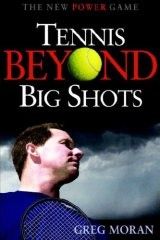June 2006 Article
Mortal Tennis/Circle Game Archive
Tennis Server
|

 |
Finish this sentence, "Tennis is a game of..." What one word first pops into your head as you ponder this question: strokes, strategy, fitness? I suspect quite a few of you, in today's power obsessed culture, immediately thought of the word power. Though, to a certain extent, all of these are elements of tennis, none are the magic word that I'm looking for. I won't keep you in suspense any longer. Over and above everything else... Tennis is a game of errors That's right. As I've written in the past and repeated to my students hundreds of time, 85% of all points played, at every level of the game, are decided by one player or the other missing a shot. The main difference in levels of play are the types of errors that are ending points. At the lower levels of the sport, a vast majority of the errors are unforced and we all know what those are: we try to hit the ball too hard, too close to the line or too low over the net. As players improve the game is still about errors but now more and more of those errors are forced. For example, as I approach the net, you drive the ball down at my feet and force me to miss. Perhaps you attack the net, putting me under pressure and that pressure forces me to miss my passing shot. So, there is no debate. Tennis is a game of errors and yet what do many players spend their time trying to learn to do? You got it. They take hundreds of lessons and spend thousands of dollars trying to learn to hit winners. The sad reality is that these players are trying to learn to do something that actually happens less than 15% of the time. Doesn't make a whole lot of sense to me. To take your game to the next level, I want you to change your approach. Instead of trying to hit winning shots, focus on:
The best way to limit those silly, unforced errors that plague us all is to commit to playing percentage tennis. We've all heard of percentage tennis so I won't go into it here however, my Tennis Server colleague, Ron Waite wrote a wonderful column a few years back titled "Percentage Tennis...the odds are in your favor." You can find it at: http://www.tennisserver.com/turbo/turbo_97_2a.html It's a great article which thoroughly outlines the principles of percentage tennis. Check it out and incorporate Ron's strategies into your game and you'll see your errors decline dramatically. Forcing your opponent into making errors I feel that there are two key ways to force your opponent into committing errors and the first is to simply get a few balls back in the court. By doing so you'll be able to take advantage of the fact that most recreational players have a 2-3 shot attention span. Perhaps this is not a particularly nice thing to say but I've been teaching tennis for nearly thirty years so I know that it's true. Now, of course, high level players have learned to extend their ability to focus on the game and that's one of the main reasons they're higher level players. However, for most players, two or three shots and they're finished. Their mind wanders, they try a low percentage shot and the point ends. The next time you step onto the court, commit to hitting three shots back every point. Nothing fancy, just get the ball back. I think you'll be surprised at how this simple strategy wins you many, many points. The next key to forcing your opponent into errors is to gain superior position on the court and this means coming to the net. Be it singles or doubles, when you or your team take the net you put tremendous pressure on your opponent(s). They have to hit a good shot or else you'll be able to put the ball away. This "pressure" will often force them into trying a low percentage shot which will usually hand you the point. Now this doesn't mean that you should just blindly charge the net but an attack at the appropriate time behind a solid approach shot will frequently be all you need to force an error and gain the point. So forget about hitting "winners." In reality, the number of winners you hit will have very little bearing on the outcome of your matches. Instead, play percentage tennis to cut down on your number of errors, while at the same time focus on forcing your opponent into making errors. I can virtually guarantee you'll see a big difference in your results.
This column is copyrighted by Greg Moran, all rights reserved.
Greg Moran is the Head Professional at the Four Seasons Racquet Club in Wilton, Connecticut. He is a former ranked junior and college player and certified by both the USPTA and USPTR. Greg has written on a wide variety of tennis-related subjects for numerous newspapers and tennis publications including Tennis, Tennis Match and Court Time magazines. He is also a member of the FILA and WILSON Advisory Staffs.
Questions and comments about these columns can be directed to Greg by using this form.
|



October 2022 Tennis Anyone: Patterns in Doubles by John Mills. September 2022 Tennis Anyone: Short Court by John Mills. |

 You will join 13,000 other subscribers in receiving news of updates to the Tennis Server along with monthly tennis tips from tennis pro Tom Veneziano.
You will join 13,000 other subscribers in receiving news of updates to the Tennis Server along with monthly tennis tips from tennis pro Tom Veneziano. 